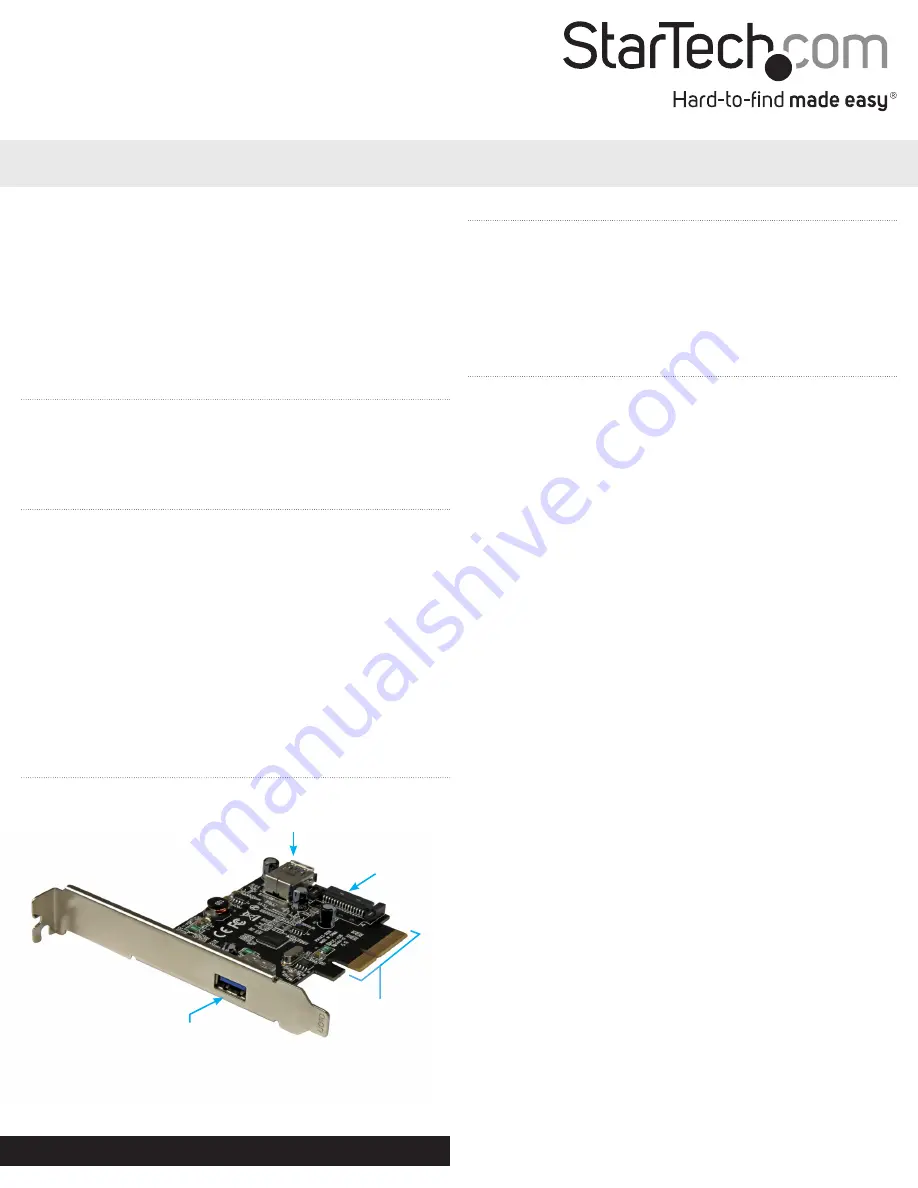
Instruction manual
FR:
Guide de l’utilisateur - fr.startech.com
DE:
Bedienungsanleitung - de.startech.com
ES:
Guía del usuario - es.startech.com
NL:
Gebruiksaanwijzing - nl.startech.com
PT:
Guia do usuário - pt.startech.com
IT:
Guida per l’uso - it.startech.com
Manual Revision: 10/02/2015
For the latest information, technical specifications, and support for
this product, please visit www.startech.com/PEXUSB311EI
Packaging contents
• 1x 2-port USB 3.1 (10Gbps) card - 1 ext, 1 int
• 1x low-profile bracket
• 1x instruction manual
System requirements
• Computer with an available PCI Express slot (x4, x8, x16)
• 15-pin SATA power connector (optional, but recommended)
• Any of the following operating systems:
- Windows® 10 (32-bit or 64-bit)
- Windows 8 / 8.1 (32-bit or 64-bit)
- Windows 7 (32-bit or 64-bit)
- Windows Server® 2012, 2008 R2
- Mac OS® 10.9 and later (tested up to 10.10)
- Linux® 3.5
Operating system requirements are subject to change. For the latest
requirements, please visit www.startech.com/PEXUSB311EI.
Product diagram
PEXUSB311EI
2-Port USB 3.1 (10Gbps) Card - USB-A, 1x External, 1x Internal - PCIe
USB 3.1 port
(external, USB-A)
USB 3.1 port
(internal, USB-A)
PCIe x4
connector
SATA power
connector
About USB 3.0, USB 3.1 Gen 1, and USB
3.1 Gen 2
USB 3.0 is also known as USB 3.1 Gen 1. This connectivity standard
offers speeds up to 5Gbps.
USB 3.1 Gen 2 offers speeds up to 10Gbps. The PEXUSB311EI is a USB
3.1 (10Gbps) Gen 2 card.
Installation
Install the USB 3.1 card
WARNING!
PCI Express cards can be severely damaged by static electricity. Make
sure that you’re properly grounded before you open your computer
case or touch your PCI Express card. You should wear an anti-static
strap when you install any computer component. If an anti-static
strap isn’t available, discharge any built-up static electricity by
touching a large grounded metal surface for several seconds. Only
handle the PCI Express card by its edges and don’t touch the gold
connectors.
1. Turn off your computer and any devices or peripherals that are
connected to it (for example, printers, external hard drives, and so
on).
2. Unplug the power cable from the back of your computer.
3. Disconnect any peripheral devices that are connected to your
computer.
4. Remove the cover from your computer case. Consult the
documentation that came with your computer for details about
how to do this safely.
5. Locate an open PCI Express x4 slot (or higher) and remove the
corresponding metal cover plate from the back of your computer
case. Consult the documentation that came with your computer
for details about how to do this safely. This card works in PCI
Express x4, x8, or x16 slots.
6. Gently insert the card into the open PCI Express slot and fasten
the bracket to the back of the case.
Note:
If you install the card into a small form-factor or a low-profile
desktop computer, it may be necessary to replace the pre-installed
standard-profile bracket with the included low-profile (half-height)
installation bracket.
7. (Optional): Connect a 15-pin SATA power connector from your
computer’s power supply to the card’s SATA power connector.
Note:
It is recommended that you connect SATA power to ensure
sufficient power is provided to the card as well as to each USB 3.1
port.
8. Place the cover back onto your computer case.
9. Reconnect the power cable to the back of your computer.
10. Reconnect all of the peripheral devices that you disconnected in
step 3.
11. Turn on your computer.



















